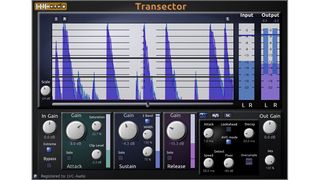The developer tells us why he loves to program and how an LVC-Audio product is born.
Why did you start LVC-Audio?
"The plugins come from my passion to create. Everyone in this industry has a passion for music. Some are passionate musicians, some are passionate writers/ producers, mixing engineers, or whatever. I'm passionate about designing tools that can be used by amateurs and professionals to make better-sounding music. I get the same feeling when I'm coding an awesome plugin as when I'm playing bass in a band."
Metering features prominently in your plugins. Why are meters so important?
"Proper gain-staging is an important aspect of recording and mixing, even within the digital realm. It's very easy to push plugins and DAWs too hard in an attempt to balance a mix. When values go above 0dBFS, it's really unpredictable what will happen. Some plugins work fine above this level, and others perform erratically. Meters are a constant reminder to ensure appropriate levels."
You mentioned once that vintage-style control knob graphics have nothing to do with software. What are your thoughts now?
"Well, I might have to go back on my previous comments about knobs. Knobs serve a purpose, but they also lock you into concepts that may or may not be relevant in the plugin world.
"Everyone knows what a knob is and how it works: you turn it right to get more of something and left to get less. There's also a trend with plugins to look as old and beaten as possible - as if the older the plugin looks, the more expensive it sounds. This makes no logical sense. I really respect Sean [Costello] from ValhallaDSP. He went completely opposite from the trend to 'look real'."
"I get the same feeling when I'm coding an awesome plugin as when I'm playing bass in a band."
How did you come up with the concepts for your plugins?
"They came from my own passions, experiments and accidents. For Transector, I started working on the design, and different controls and features started to emerge.
"Then there are the LVC-Audio accidents, like PreAMPed. I was working on a compressor, and I started to add features to make it sound analogue. I played around with the controls within a compressor for about a day before I realised that it was better suited as a separate plugin.
"I also get many ideas from users - emails, forum posts and general suggestions. My upcoming plugin is based partially on a forum post where people were asking for a plugin feature that didn't exactly exist. If you have ideas or feedback, I'm all ears."
What's next from LVC-Audio?
"There will be a new freebie this summer as part of KVR's Developer Challenge 2014. I think many people will find it to be a useful tool for mixing and mastering. I also have plans for some compressor-based plugins. Right now, my plans are to stay with mixing tools. I don't want to rule out a synth, but I can't imagine it anytime soon. Of course, I'm still adding in development time for happy accidents and great user ideas. Just like writing music, I view development as a creative and organic process."


